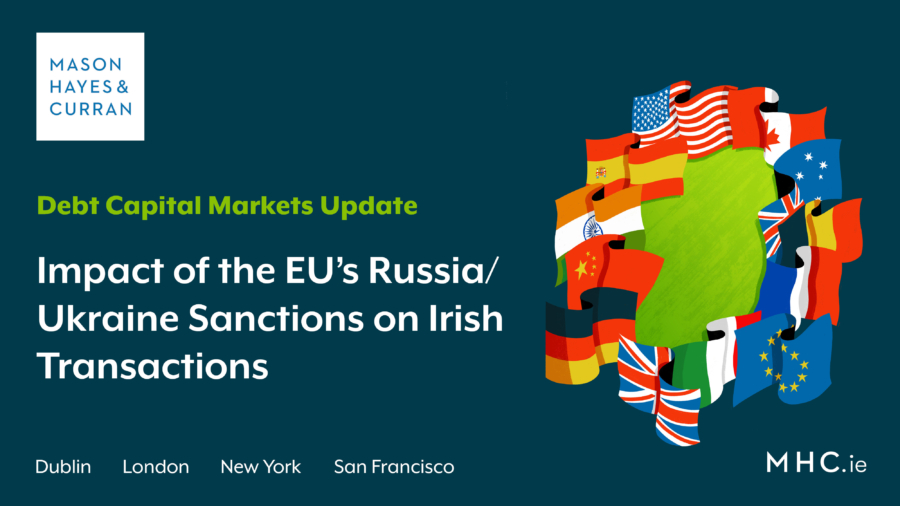
The EU’s Russia/Ukraine sanctions regime is part of the EU’s foreign policy response to Russia’s continuing aggression against Ukraine. The EU’s sanctions regime was dramatically expanded during 2022 with nine additional packages
These sanctions apply within the territory of the EU, to EU nationals in any location, to companies and organisations incorporated in a Member State, and on-board aircraft or vessels under a Member States’ jurisdiction. In Ireland, a person who is guilty of an offence under these regulations can be subject to both a fine and imprisonment.
Although the framework of the EU’s Russian sanctions regime has been in place since 2014, most restrictive measures were adopted during the course of 2022. The regular adoption of new sanctions ‘packages’ has made tracking the evolving sanctions landscape challenging, particularly when assessing the possible implications for business and transactions conducted in Ireland where a Russian nexus occurs only tangentially.
We continue to advise numerous clients on their obligations and responsibilities under EU sanctions regulation. In some cases, sanctions are directly applicable to the core parties and/or business activities, and the need for a sanctions review is obvious. However, some transactions which on the surface concern exclusively Irish/EU interests have been shown to require careful review based on, for example, a Russian entity which is a member of the wider company group, or an ultimate beneficial owner who is individually designated.
EU adopts tenth package of sanctions against Russia
The EU adopted its tenth package of Russia/Ukraine sanctions on 25 February 2023. The ten packages build on the sanctions imposed since 2014, following the illegal annexation of Crimea and Sevastopol. The most recent package includes a range of measures designed to increase pressure on Russia and its government.
Scope of the tenth package
Expanded import and export prohibitions
The EU’s main sanctions instrument concerning Russia’s aggression in Ukraine which prohibits/restricts trade in certain goods and services with Russia is Council Regulation (EU) No 833/2014. This package further expands the scope of import and export prohibitions under Council Regulation (EU) No 833/2014.
The new additions include:
- Expanded export ban covering critical technology and industrial goods, such as electronics, specialised vehicles, machine parts, and spare parts for trucks and jet engines.
- Tighter export restrictions on an additional 96 entities (including 7 Iranian entities) supporting directly Russia’s military and industrial complex.
- Further restrictions on imports of goods which generate significant revenue for Russia, such as asphalt and synthetic rubber.
Asset freeze measures
The EU’s main sanctions instrument imposing asset freezes on designated natural and legal persons in connection with Russia’s aggression in Ukraine is Council Regulation (EU) No 269/2014. A further 87 individuals and 34 legal entities were added as designated persons under Council Regulation (EU) No 269/2014. These include Alfa-Bank JSC, PJSC Rosbank, Tinkoff Bank JSC and the National Wealth Fund of the Russian Federation. Asset freeze restrictions now apply to 1473 individuals and 205 entities.
Those designated under this regulation are subject to an asset freeze and prohibition on funds or economic resource being made available to them. Designated natural persons are also subject to an EU travel ban, which is legislated for at Member State level.
To increase the effectiveness of asset freeze measures, more detailed reporting obligations on funds and economic resources belonging to listed individuals and entities have been introduced. New reporting restrictions were also introduced with respect to immobilised reserves and assets of the Central Bank of Russia.
Sectoral sanctions
A range of measures extending sectoral sanctions has also been introduced:
- Action to suspend the broadcasting licenses of two additional media outlets: RT Arabic and Sputnik Arabic
- Restrictions on Russian nationals holding positions in the governing bodies of EU critical infrastructures and entities
- A prohibition on providing gas storage (excluding the part of LNG facilities) to Russian nationals
Looking forward
Working in close coordination with the UK and the US, the EU continues to develop and refine its Russian sanctions regime. Keeping abreast of changes to both the regulation and the EU’s associated guidance and best practices is key to understanding and complying fully with the measures.
As the EU’s sanctions measures targeting Russia expand and become more punitive, it is important to guard against complacency. Restrictive measures take many forms, change frequently, and have a long reach. Often, the question of whether sanctions apply in a particular set of circumstances is nuanced and requires careful analysis and reasoning. Unforeseen sanctions issues can derail entire transactions in seemingly innocuous circumstances and have serious criminal implications for those in breach.
For more information and expert advice in navigating the ever-evolving regulations, contact a member of our Debt Capital Markets & Listing team.
The content of this article is provided for information purposes only and does not constitute legal or other advice.







